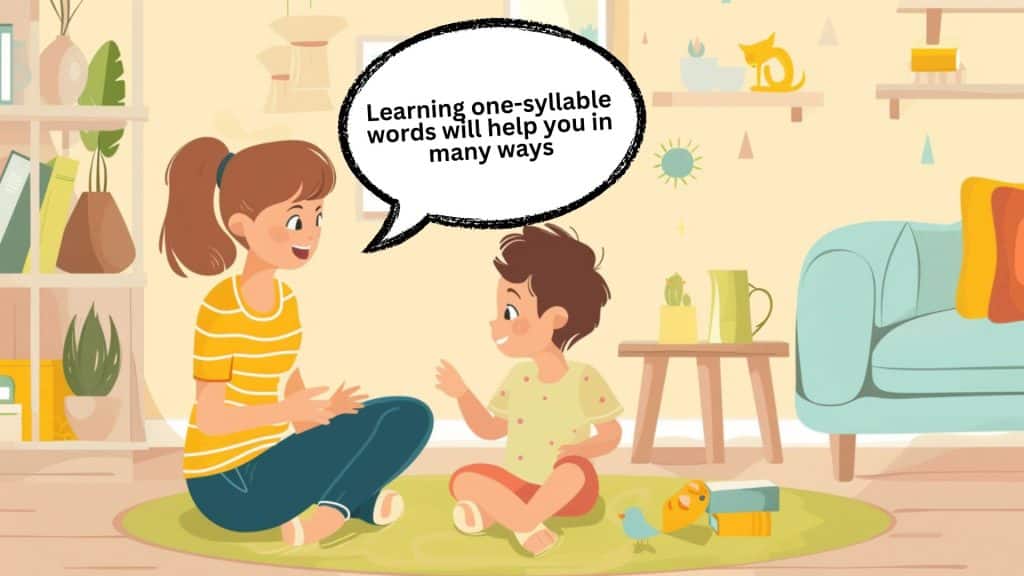Looking to boost your vocabulary? One-syllable words are the way to go!
But you might be thinking, “How can short words help me sound smarter?”
The truth is that many people struggle to express themselves clearly and effectively, often relying on long, complicated words that can confuse their audience.
Here’s the good news: using simple, one-syllable words can make your speech more engaging, powerful, and easy to understand.
In this blog post, we’ll explore how focusing on short, punchy words can take your language skills to new heights, making you a more confident and compelling communicator.
Get ready to discover the magic of one-syllable words and transform how you speak and write!
1. Understanding Word Stress

Word stress is a crucial aspect of English pronunciation that involves emphasizing certain syllables in a word, making them louder, longer, and higher in pitch.
Mastering word stress is essential for improving speech clarity and ensuring that listeners can easily understand your message.
In English, words can be divided into two categories: content words and function words.
| Aspect | Content Words | Function Words |
|---|---|---|
| Definition | Words that carry the main semantic load of sentences. | Words that serve grammatical purposes and connect content words. |
| Types of Words | Nouns, main verbs, adjectives, adverbs. | Pronouns, prepositions, conjunctions, articles, auxiliary verbs, modal verbs. |
| Purpose | Provide essential information about the topic or action. | Structure the sentence by showing relationships between content words and organizing grammar. |
| Stress in Pronunciation | Typically stressed in speech to emphasize their meaning. | Usually unstressed or less stressed in speech. |
| Examples | Dog (noun), Beautiful (adjective), Quickly (adverb) | He (pronoun), In (preposition), And (conjunction), The (article), Is (auxiliary verb) |
| Role in Sentence | Determine the core meaning and are crucial for understanding the main message. | Support the content words by showing their relationships and help form the structure of sentences. |
| Change in Meaning | Changing or misusing content words can significantly alter the meaning of a sentence. | Misusing function words might confuse the grammatical structure but typically won’t change the fundamental meaning. |
Stressing content words while reducing function words creates the natural rhythm of English.
By properly stressing one-syllable content words, you can:
- Draw attention to the most important words in your message
- Create a more natural and engaging rhythm in your speech
- Help listeners identify and process key information more easily
- Reduce the influence of your native language’s pronunciation patterns on your English
Incorporating word stress, particularly on one-syllable content words, is a powerful way to enhance your English pronunciation and ensure your message is conveyed effectively to your audience.
2. Practical Application and Examples

Mastering word stress, particularly in one-syllable words, is crucial for effective communication in everyday situations.
By stressing the right words, you can convey your message more clearly and engage your listeners better.
Examples serve as practical demonstrations of how to apply word stress theory in real conversations.
They provide a visual guide for learners to follow and help them understand how to incorporate proper stress into their own speech.
- Identify the content words (nouns, verbs, adjectives, adverbs)
- Elongate the vowel sound and slightly increase the volume and pitch of these words
- Reduce the emphasis on function words (articles, prepositions, pronouns, conjunctions)
Example 1: “Let’s wait for the bus.” Stress “let’s,” “wait,” and “bus” while reducing emphasis on “for” and “the.” LET’S WAIT for the BUS.
Example 2: “When I’m tired, I drink some tea.” Stress “when,” “tired,” “drink,” and “tea” to convey the main idea. WHEN I’m TIRED, I DRINK some TEA.
Additional examples:
- The GIRL SANG a SONG. (Stress “girl,” “sang,” and “song.”)
- I SAW a BIG DOG in the PARK. (Stress “saw,” “big,” “dog,” and “park.”)
3. Stressing One-Syllable Words in Longer Sentences

a. Strategies for Complex Sentences
Longer sentences often contain a mix of content and function words, making it challenging to maintain clear communication.
To effectively stress one-syllable words in complex sentences:
- Identify the key content words that carry the main message
- Stress these words to emphasize their importance
- Maintain a natural rhythm by balancing stressed and unstressed words
b. Illustration with a Complex Example
“The man you told me about came by the office.”
Breakdown:
- Stress “man,” “told,” “about,” “came,” and “office”
- Reduce emphasis on “you,” “me,” and “by” The MAN you TOLD me aBOUT CAME by the OFfice.
Stressing the key words helps maintain a clear rhythm, making it easier for listeners to follow and understand the main points of the sentence.
4. Benefits of Mastering One-Syllable Words

a. Speech Clarity and Accent Reduction
Mastering stress on one-syllable words can significantly improve speech intelligibility. By emphasizing the right words, your message becomes clearer and more easily understood by listeners.
Focusing on stress patterns also helps minimize the influence of your native accent on your English pronunciation.
Your speech will start sounding more natural and native-like as you practice correct stress.
b. Professional and Daily Communication
In daily communication, using proper stress on one-syllable words enhances the effectiveness of your interactions.
It helps you express yourself more confidently and clearly in various social settings, such as conversations with friends, family, or colleagues.
In professional environments, clear communication is essential.
Properly stressing one-syllable words in presentations, meetings, and client interactions ensures that your ideas are conveyed effectively and persuasively.
This skill can greatly impact your success in the workplace.
Conclusion
In conclusion, mastering the art of stressing one-syllable words is a game-changer for your English communication skills.
By emphasizing the right words, you can make your speech clearer, more engaging, and easier for others to understand.
Remember, it’s not about using fancy words but rather about using simple words effectively.
Practice the techniques we’ve discussed, and you’ll soon find yourself speaking with greater confidence and clarity in any situation, whether a casual conversation or a professional presentation.
So, take the time to focus on those short, powerful words, and watch as your ability to connect with others through language reaches new heights.
Ready to put your newfound knowledge into practice? Start by identifying one-syllable words in your next conversation and give them the stress they deserve!
Frequently Asked Questions
What is one way you can improve your vocabulary?
One way to improve your vocabulary is by reading extensively. This exposes you to new words in context, helping you understand their meaning and usage.
How can I improve my vocabulary fast?
To improve your vocabulary fast, make a habit of learning and using new words daily, practice using them in conversations, and play word games like crosswords.
What is a good one-syllable word?
Some good one-syllable words include- brave, strong, wise, kind, love, hope, joy, peace, trust, and faith. These words pack a lot of meaning in a single syllable.
How do you identify one-syllable words?
To identify one-syllable words, count the number of vowel sounds in a word. If there is only one vowel sound, it is a one-syllable word, regardless of spelling.
